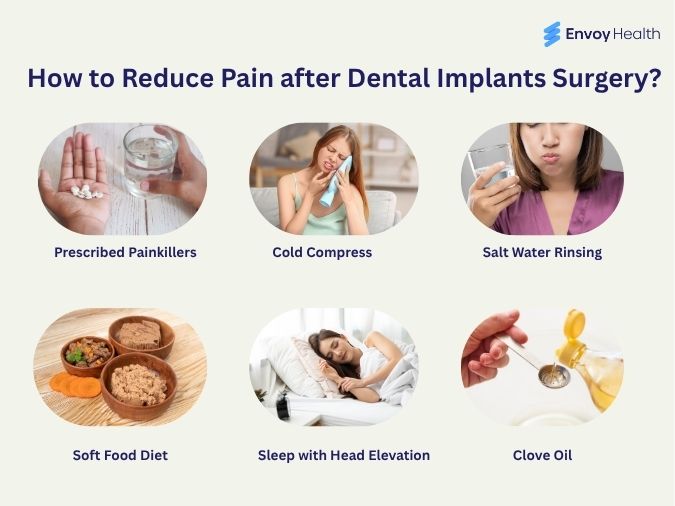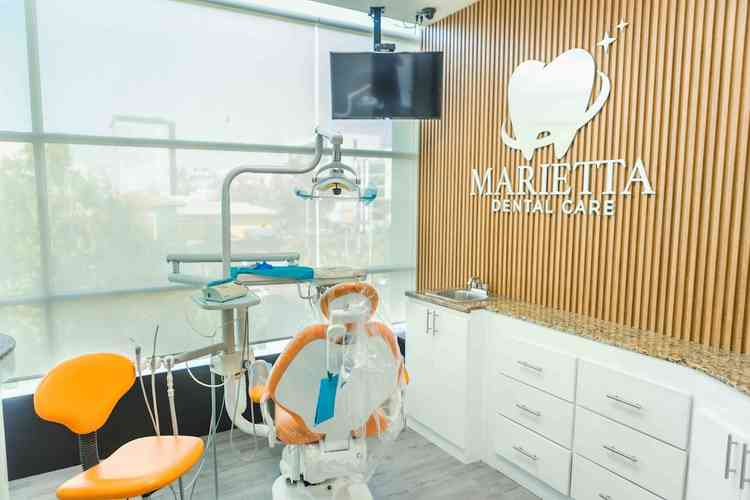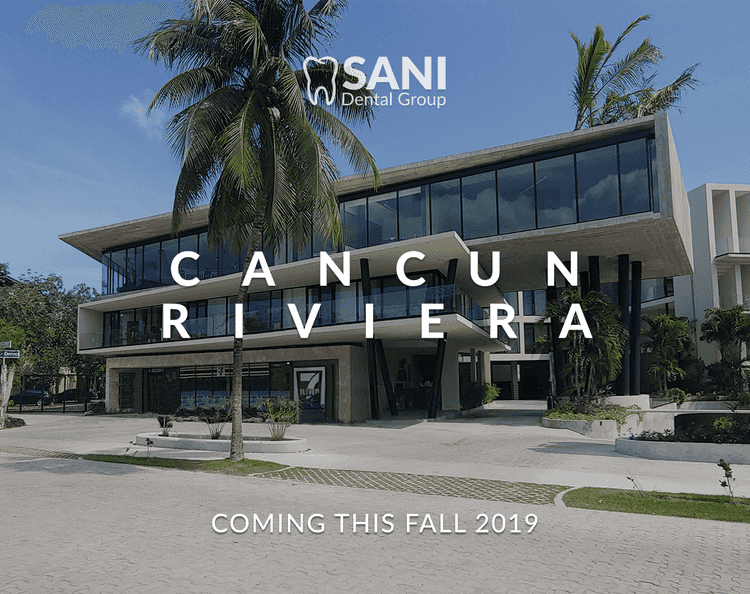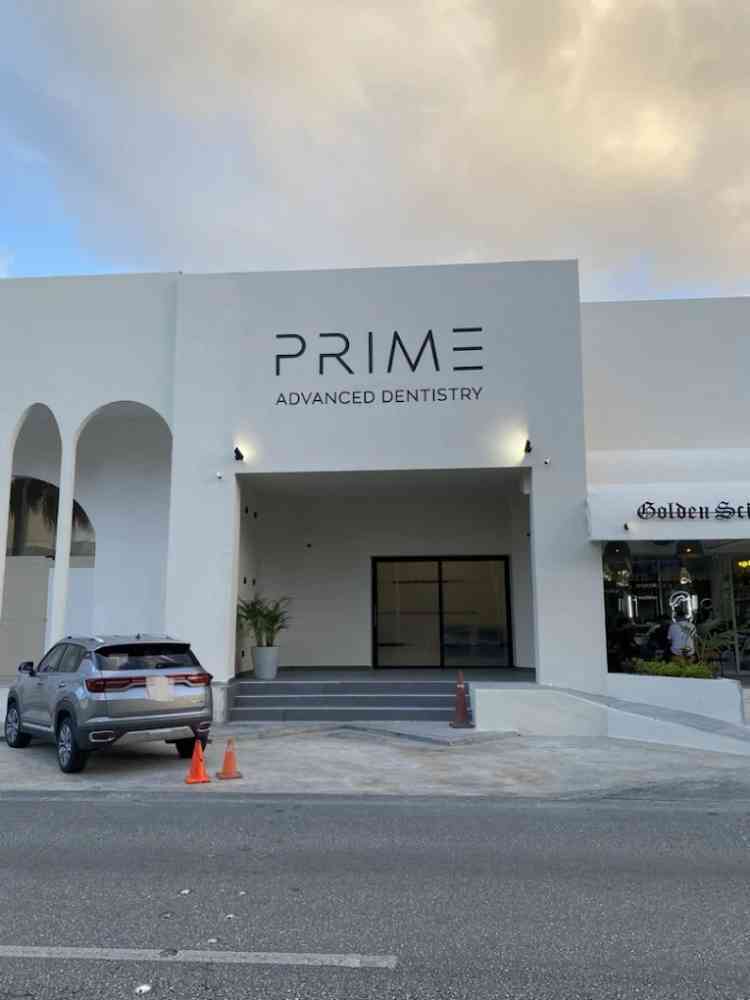How to Relieve Pain from Dental Implant Like a Pro: Expert Advice

Prathyusha Itikarlapalli
- Content Writer

Gustavo Moreno Vargas
- Reviewed by

Key Takeaways
- Pain after dental implants is manageable with pain medications and lasts for a few days after the procedure. Symptoms such as tissue inflammation, soreness, redness, and bleeding accompany the dental implant pain.
- Relying on soft food, applying a cold compress, and keeping the head elevated above the level of the heart, while using pain medication, aids in pain management and surgical wound healing.
- Intense pain for prolonged periods, even after one week after implant surgery, occurs due to delayed healing, infection, nerve irritation, and inflammation. A dentist consultation can help improve the condition.
Pain After Dental Implants: Why It’s a Concern?
Dental implants are small metal screws that are fixed in the jawbone to serve as artificial tooth roots and support crowns and dentures. The procedure is virtually painless as it's carried out under local anesthesia. Dentists inject the anesthetic into the jaw so you remain awake and aware, but don’t feel pain during the surgery.
It's common for most patients to worry about the throbbing pain after dental implants. Pain after dental implants is tolerable and common after the surgical procedure. During implant surgery, dentists make cuts in the gum tissue to gain access to the underlying jawbone. They drill a hole within the jawbone to place the dental implant screws. While a single implant supports a single dental crown, multiple implants are used in full-mouth restoration. Then you get around four to eight implants individually fixed in a jaw. As a result, patients undergoing full-mouth dental implants may experience slightly more post-surgical soreness than those receiving a single implant.
Managing the pain in jaw after dental implants isn’t just about comfort. Studies suggest that uncontrolled and elevated pain levels trigger various inflammatory responses and hormone cycles. The ultimate outcome is a delay in tissue healing and wound recovery.[1] So, proper pain management ensures better healing, appropriate osseointegration, and long-term success of the implant treatment.
What Causes Pain With Dental Implant Early After Surgery?
Below, we detail the common causes of pain due to dental implants during the initial days after surgery:
- Normal surgical healing: Typically, this involves swelling and soreness of the tissues caused by surgical incisions and drilling of the gums and jawbone. Expect tenderness and a slight throbbing sensation around the implant site. There can be peaked elevations in pain intensity during the first 24 hours after surgery. However, with the right aftercare and painkillers, the recovery process improves within a few days.[2]
- Nerve irritation: Your jaws contain a complex yet delicate network of motor and sensory nerves. So implants, when accidentally drilled too close to the nerves, can lead to nerve irritation. In other cases, excessive or over-speed drilling into the jawbone can cause thermal injury to the nerve. Either condition triggers neuroinflammatory pathways, causing pulsating pain after dental implants. You will feel sharp, electric sensations, burning, and tingling across the chin, lips, and cheeks. Some patients also experience changes in taste with unpleasant sensations.
- Sinus problems: Maxillary sinuses lie closer to the tooth roots in the upper jaw. So, placing implants in these jaws should be carried out carefully. When implants are placed too high, or in cases of excess bone loss, the implant, even when positioned correctly, can be closer to the sinuses. You will experience throbbing pressure in the cheeks, forehead, and around the eyes, along with a lost of sense of smell and a blocked or stuffy nose.[3]
- Psychological factors: Heightened anxiety and fear of pain can elevate the stress levels and pain response without many serious biological reasons. Overestimating the pain and an exacerbated pain memory of a previous dental procedure are common causes for this. Studies suggest that dentists can help patients navigate this through effective and assuring counselling. This will help them set a clear expectation for what happens after implant surgery and the right steps to address it.[4]
How Bad Is the Pain After Dental Implants?
Pain after successful dental implant surgery is mild to moderate and is generally tolerable. Most patients experience pain and discomfort at their maximum during the first 24-48 hours after implant surgery. Don’t worry, as you will be on pain medications. Further, following the recommended aftercare measures will also help you mitigate pain. While the causes and intensity can be diverse, dentists suggest some effective measures for managing pain and anxiety. So you can recover more effectively and get back to your daily routine as the tissues heal. But if you are wondering about how to relieve pain after dental implant? The next section is of help.
How To Help Dental Implant Pain?
Here we outlined the measures of best pain relief after dental implants.
- Use the prescribed painkillers: Follow your dentist's recommendations of painkillers or non-steroidal anti-inflammatory drugs (NSAIDs). These work by inhibiting COX enzymatic cascades and prostaglandin production, helping reduce swelling and relieving severe pain after implant placement.[5] However, you should slowly shift the reliance on pain medications towards home remedies with time.
- Apply a cold compress: Wrap a cold pack or ice in a clean towel and apply it outside of your face. Note that you should not touch the skin directly. The cold compress constricts blood vessels, slowing blood flow and limiting fluid build-up. A blood clot forms shortly, stopping the bleeding, reducing the swelling, and lessening the pain intensity.
- Salt water rinse: Rinsing the implant area using salt water is an effective and affordable way to reduce swelling, inflammation, and pain. It also cleanses the oral cavity, reducing the bacterial count and preventing infection. Mix a spoonful of common salt into a cup of water, then gently swish it around in your mouth for about 30 seconds. Being gentle is crucial here, as harsh swirling can loosen the freshly formed blood clots.
- Rely on a soft diet: Choose foods that don’t require chewing to help you prevent pressure or extra stress to move your jaw. Opting for foods such as yogurt, ice cream, soups, smoothies, scrambled eggs, mashed potatoes, oatmeal, and well-cooked pasta not only helps balance your nutrient needs but also reduces sensitivity and irritation at the implant site.
- Head elevation while sleeping: Keeping your head above heart level lowers blood pressure. Add extra pillows as props to keep your head elevated while sleeping or resting. This, in turn, reduces swelling, minimizes pressure, and enhances comfort.
- Clove oil: The antibacterial and anti-fungal properties of clove oil fight infection-causing bacteria and offer relief from pain after implant surgery. Dilute clove oil with a carrier oil, such as coconut oil, before use. However, consult your doctor before using clove oil, as it slows down blood clotting and may not be suitable for everyone.

While you rely on home remedies for dental implant pain, remember to attend your scheduled follow-up visits with your dentist. They will monitor the progress of your implant osseointegration and tissue healing. Dentists take X-rays to evaluate the alignment of the implant, the health of the gums, and the health of the jawbone. They also take necessary actions if required. Now, let’s shift focus from “what helps pain after dental implants?” Over to “how long does pain last after dental implants?”. Scroll further down for more information.
How Long Do You Have Pain After Dental Implants?
Pain from dental implants lasts for 7-10 days, after which it slowly fades. Typically, most patients notice pain and discomfort at their maximum during the first 48-72 hours following implant surgery. Don’t worry, you will be under pain medication to handle this. After this period, the pain slowly subsides with proper aftercare. While complete healing takes a few months, the surgical incisions begin to heal within a few days.
However, don’t ignore intense, prolonged pain that lasts for more than 2 weeks. Generally, you should return to your normal activities within 10 days. Pain that persists definitely requires a dentist's evaluation. It can be due to improper osseointegration, implant rejection, or infection. Further, symptoms of redness, soreness, bleeding gums, and pus discharge around the implant site accompany abnormal pain due to complications.
How Long To Take Ibuprofen After Dental Implants?
Ibuprofen is a non-steroidal anti-inflammatory drug that targets the body’s inflammatory response after implant surgery. It reduces discomfort and should be used for the first 3 days after implantation, according to the recommended dosage. Following this, you are required to use it for 5-7 days, with dosage and frequency varying based on the intensity of the pain. Your healthcare provider will decide the dosage based on your age and pain intensity.
Long-Term Care After Dental Implant Surgery
Caring for dental implants is much like caring for your natural teeth. But with a little extra attention. Maintain good oral hygiene by brushing twice a day with a soft-bristle toothbrush and using non-abrasive toothpaste. Floss daily to remove plaque, or consider a water flosser for easier, more thorough cleaning. Habits like smoking and teeth grinding can harm your oral health. Avoid them and maintain regular dental checkups and professional cleanings. They prevent gum inflammation and ensure your implants stay healthy and long-lasting.
Final Word!
Understanding how to relieve pain from dental implant procedures is key to a smooth, successful recovery. While some soreness is completely normal in the first few days, consistent care, proper hygiene, and timely follow-ups with your dentist can make all the difference. From cold compresses and prescribed painkillers to soft foods and rest, every step you take supports faster healing. For the best pain relief after dental implants, always combine at-home care with professional guidance. Listen to your body, follow your dentist’s aftercare instructions, and never ignore persistent discomfort. With the right approach, you can ensure your implant heals securely, restoring both comfort and confidence in your smile.
Ready to start your dental implant journey with trusted experts? Sign up with Envoy Health today and get connected to top-rated clinics offering expert care, smooth recovery, and personalized support every step of the way.
References
- Exploring The Effect Of Wound-Related Pain On Psychological Stress, Inflammatory Response, And Wound Healing
- Investigation And Analysis Of Pain After Dental Implantation And Its Influencing Factors
- Characteristics And Impacts Of Dental Implant Displacement Into The Maxillary Sinus
- Pain Experience After Dental Implant Placement Compared To Tooth Extraction
- Randomized, Placebo‐controlled Pilot Study Of Naproxen During Dental Implant Osseointegration
- Do Dietary Supplements And Nutraceuticals Have Effects On Dental Implant Osseointegration? A Scoping Review
- Analgesics For Dental Implants: A Systematic Review
Disclaimer
The information in this article is for educational purposes only and does not replace medical advice. Always consult your doctor before starting any treatments.
Dairy products, despite being soft and rich in calcium, phosphorus, and sugars, are generally avoided immediately after dental implant surgery. It's because the sugar content can serve as an easy food source for oral bacteria, providing a base for infections. However, going no-dairy for prolonged periods is not recommended either. Calcium and phosphorus are crucial for bone health, and avoiding them for extended periods can lower jawbone quality.[6] Go with your dentist's recommendations for diet and allow your implants to heal better.
Ensure you get enough rest to prevent the dental implants from hurting you. All you can do is rely on a liquid, soft diet during the early stages of healing. Apply a cold compress to the cheek to reduce swelling and soreness. Keep your head elevated while resting and sleeping. This will lower the blood pressure in your facial tissues and slow down bleeding.
Studies suggest that administering painkillers such as ibuprofen, piroxicam, dexketoprofen trometamol, dexamethasone, and lornoxicam is associated with better pain relief and enhanced patient satisfaction.[7] Your dentist will help you choose the most suitable one for your case, based on your overall health and body condition.
Dental implant pain typically subsides between 7 and 10 days after surgery. While you face the worst pain during 48-72 hours, don’t worry, as you will be under pain medications.
Throbbing pain from a dental implant on the day of surgery or after the procedure can be due to tissue inflammation at the implant site. This will gradually subside over time, and you will feel better as you apply an ice pack or take pain medications. But a throbbing pain 3 days after dental implant surgery can be a sign of a serious problem. It can be due to infection or implant instability, or nerve irritation. See your dentist if this pain is accompanied by soreness, fluid or pus discharge, or altered taste. On the other hand, sudden tooth implant pain after 2 years, can be a serious sign of complications such as peri-implantitis, implant dislodgement, or bite issues. Typically, this situation is accompanied by symptoms such as unusual swelling, gum inflammation, and fluid discharge.
So, we partner with the premier healthcare facilities!
Send me the list








